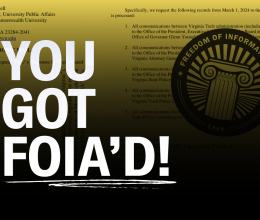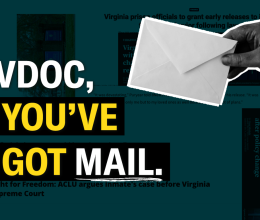The ACLU of Virginia is disappointed by the Fairfax County Circuit Court’s ruling in the case of Harrison Neal v. Fairfax County Police Department and Colonel Edwin Roessler, Jr., Chief of Police.
We believe strongly that a vehicle license plate number is personal information covered by provisions of the Government Data Collection and Dissemination Practices Act (Data Act). The Data Act bars the government from collecting, storing, or disseminating personal information about anyone without a reason established in advance for doing so. The Data Act also states that any collection of personal information must be appropriate and relevant to the purpose for which it is collected. In this case, Fairfax County Police takes pictures of vehicle license plate numbers using a device that registers the location, time and date on which the picture was taken for no reason at all. They keep this information for a year “just in case” it might come in handy in some future, speculative investigation. Images of Neal’s license plate number, including the time, date, and location of his whereabouts, was collected and stored by the defendants despite the defendants not having clearly established its need or any connection to a criminal investigation.
ACLU-VA Executive Director Claire Guthrie Gastañaga said of the judge’s decision, “It’s very hard to understand how a social security number or other government issued number is deemed personal information, but your license plate number is not. All these numbers are indexed to your name across various databases easily accessible to law enforcement agencies. In a previous hearing in 2015, another Fairfax judge in this case pointed out, if a license plate number didn’t allow the police to identify a person, why would they want to collect this data at all?”
The ACLU of Virginia is currently reviewing legal options including appealing to the Supreme Court of Virginia.


